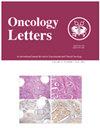Prognostic value and immunological role of cathepsin S gene in pan‑cancer
IF 2.5
4区 医学
Q3 ONCOLOGY
引用次数: 0
Abstract
. The cathepsin S (CTSS) gene encodes a lysine cysteine protease and serves an important role in the development of autoimmune diseases, inflammation and nervous system diseases. Furthermore, CTSS is implicated in tumor invasion and metastasis by the induction of tumor angiogenesis and the degradation of the tumor extracel‑ lular matrix. Nevertheless, the precise impact of CTSS on predicting pan‑cancer prognosis and its influence on the tumor microenvironment and immune infiltration in human cancers remains unknown. This present study employed a comprehensive array of bioinformatic methods to evaluate the expression of CTSS and its associations with prognosis, clinicopathological characteristics, tumor microenviron‑ ment, tumor immune infiltration, tumor mutational burden and microsatellite instability across numerous cancer types. The current study demonstrated abnormal expression and distinct genomic alteration profiles of CTSS in many of the cancers tested. Furthermore, CTSS expression exhibited close associations with the prognosis of numerous cancers. High CTSS expression was significantly associated with better overall survival and disease‑specific survival in bladder urothelial carcinoma (BLCA) and skin cutaneous melanoma (SKCM) but worse outcomes in brain lower grade glioma (LGG) and uveal melanoma (UVM). Moreover, CTSS demonstrated significant correlations with tumor mutational burden and microsatellite instability in 8 and 12 cancer types respectively, as well as different responses in immu‑ notherapy sub‑cohorts, especially in melanoma and bladder cancers. CTSS expression showed a positive correlation with stromal and immune cell scores in the four aforementioned cancers. Moreover, CTSS expression was correlated with the number of infiltrating CD8 + T cells, CD4 + T cells and macrophages. Conversely, CTSS was negatively associated with resting Mast cells, resting NK cells and resting memory CD4 + T cell infiltration in BLCA, SKCM and kidney renal clear cell carcinoma (KIRC). Furthermore, CTSS expression was correlated with immune‑related gene expression, notably PDCD1,泛癌症中猫蛋白酶 S 基因的预后价值和免疫学作用
. 组织蛋白酶S (CTSS)基因编码一种赖氨酸半胱氨酸蛋白酶,在自身免疫性疾病、炎症和神经系统疾病的发展中起重要作用。此外,CTSS通过诱导肿瘤血管生成和肿瘤细胞外基质降解参与肿瘤的侵袭和转移。然而,CTSS对预测泛癌预后的确切影响及其对人类癌症肿瘤微环境和免疫浸润的影响尚不清楚。本研究采用综合的生物信息学方法来评估CTSS的表达及其与多种癌症类型的预后、临床病理特征、肿瘤微环境、肿瘤免疫浸润、肿瘤突变负担和微卫星不稳定性的关系。目前的研究表明,CTSS在许多被检测的癌症中异常表达和明显的基因组改变谱。此外,CTSS的表达与许多癌症的预后密切相关。高CTSS表达与膀胱尿路上皮癌(BLCA)和皮肤黑色素瘤(SKCM)的总生存率和疾病特异性生存率显著相关,但在脑低级别胶质瘤(LGG)和葡萄膜黑色素瘤(UVM)中预后较差。此外,CTSS在8种和12种癌症类型中分别与肿瘤突变负担和微卫星不稳定性显著相关,并且在免疫治疗亚群中表现出不同的反应,特别是在黑色素瘤和膀胱癌中。在上述四种癌症中,CTSS表达与基质细胞和免疫细胞评分呈正相关。CTSS的表达与CD8 + T细胞、CD4 + T细胞和巨噬细胞的浸润数量有关。相反,在BLCA、SKCM和肾透明细胞癌(KIRC)中,CTSS与静息肥大细胞、静息NK细胞和静息记忆CD4 + T细胞浸润呈负相关。此外,CTSS表达与免疫相关基因表达相关,特别是PDCD1。
本文章由计算机程序翻译,如有差异,请以英文原文为准。
求助全文
约1分钟内获得全文
求助全文
来源期刊

Oncology Letters
ONCOLOGY-
CiteScore
5.70
自引率
0.00%
发文量
412
审稿时长
2.0 months
期刊介绍:
Oncology Letters is a monthly, peer-reviewed journal, available in print and online, that focuses on all aspects of clinical oncology, as well as in vitro and in vivo experimental model systems relevant to the mechanisms of disease.
The principal aim of Oncology Letters is to provide the prompt publication of original studies of high quality that pertain to clinical oncology, chemotherapy, oncogenes, carcinogenesis, metastasis, epidemiology and viral oncology in the form of original research, reviews and case reports.
 求助内容:
求助内容: 应助结果提醒方式:
应助结果提醒方式:


